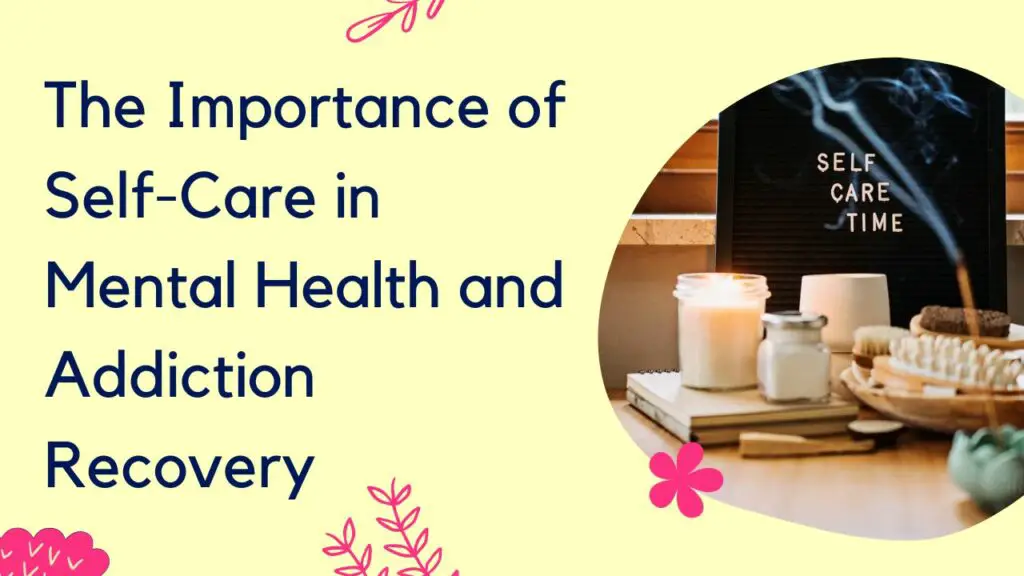Self-care plays a crucial role in maintaining and improving mental health, especially during addiction recovery.
In the journey towards healing and wellness, individuals often neglect their own well-being.
However, practicing self-care can significantly enhance the recovery process, promote emotional well-being, and reduce the risk of relapse.
This article explores the significance of self-care in mental health and addiction recovery, highlighting its various dimensions and offering practical strategies to incorporate self-care into daily life.

-
Save
Table of Contents
The Importance of Self-Care in Mental Health and Addiction Recovery
I. Understanding Self-Care
Self-care encompasses activities and practices that individuals engage in to nurture their physical, mental, and emotional well-being.
It involves making deliberate choices to prioritize one’s health and happiness. Self-care is not selfish; it is a necessary act of self-preservation and empowerment.
It involves recognizing and fulfilling personal needs, setting boundaries, and engaging in activities that promote self-nourishment and self-compassion.
II. The Impact of Self-Care on Mental Health and Addiction Recovery
- Physical Well-being: Engaging in self-care activities, such as regular exercise, adequate sleep, and a balanced diet, can have a positive impact on physical health. Physical well-being is closely linked to mental well-being, and taking care of the body can help individuals manage stress, improve mood, and increase overall resilience.
- Emotional Well-being: Self-care fosters emotional well-being by providing individuals with the tools to manage stress, regulate emotions, and cultivate self-compassion. Engaging in activities that bring joy, practicing mindfulness, seeking therapy or support groups, and setting healthy boundaries are essential aspects of emotional self-care.
- Relapse Prevention: Self-care is crucial in addiction recovery as it helps individuals develop healthy coping mechanisms and reduces the risk of relapse. By actively engaging in self-care practices, individuals can manage triggers, reduce stress, and enhance their overall well-being, creating a solid foundation for sustained recovery.
III. Dimensions of Self-Care
- Physical Self-Care: Prioritizing physical health through exercise, nutrition, sleep, and regular medical check-ups.
- Emotional Self-Care: Nurturing emotional well-being through self-reflection, therapy, journaling, mindfulness, and creative outlets.
- Social Self-Care: Cultivating healthy relationships, setting boundaries, seeking support from loved ones, and engaging in activities that promote social connection.
- Spiritual Self-Care: Exploring personal beliefs, engaging in activities that align with values, and finding meaning and purpose in life.
- Practical Self-Care: Managing time effectively, setting realistic goals, practicing stress management techniques, and engaging in activities that bring joy and relaxation.
IV. Incorporating Self-Care into Daily Life
- Identify Your Needs: Take time to understand your physical, emotional, social, and spiritual needs. Reflect on what activities and practices promote your well-being.
- Create a Self-Care Plan: Develop a personalized self-care plan that includes specific activities and practices to incorporate into your daily routine.
- Practice Self-Compassion: Be kind and forgiving to yourself. Treat yourself with the same level of care and compassion that you would extend to others.
- Set Boundaries: Learn to say no when necessary and establish healthy boundaries to protect your physical and emotional well-being.
- Seek Support: Surround yourself with a supportive network of friends, family, or professionals who can offer guidance and encouragement throughout your journey.
V. Conclusion
In the realm of mental health and addiction recovery, self-care is not a luxury but a necessity. By prioritizing
self-care, individuals can enhance their overall well-being, build resilience, and cultivate a solid foundation for sustained recovery.
It is important to remember that self-care is a personal journey, and finding what works best for you is key. Embrace self-care as an integral part of your recovery process and commit to nurturing your physical, emotional, and spiritual well-being.
-
Save

